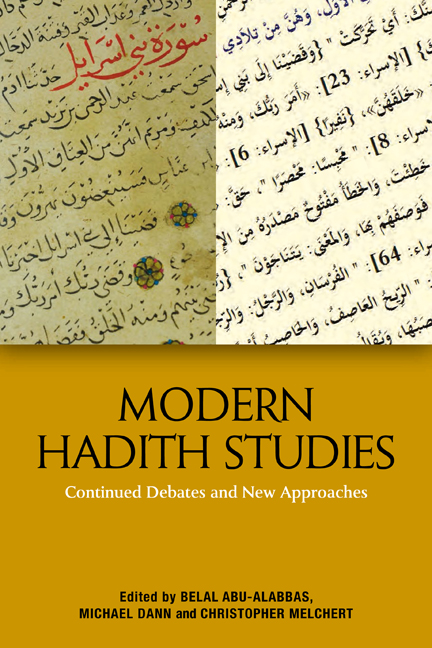Book contents
- Frontmatter
- Contents
- Figures and Tables
- Acknowledgements
- Note on Conventions
- Notes on Contributors
- Introduction
- 1 Kunnā nakrahu al-kitāb: Scripture, Transmission of Knowledge, and Politics in the Second Century AH (719–816 ce)
- 2 The History of the Adhān: a View from the Hadith Literature
- 3 Ibn al-Mubārak, Traditionist
- 4 Early ‘Traditionist Sufis’: A Network Analysis
- 5 The Common Link and its Relation to Hadith Terminology
- 6 Hadith Criticism between Traditionists and Jurisprudents
- 7 Hadith Criticism in the Levant in the Twentieth Century: From ẓāhir al-isnād to ʿilal al-ḥadīth
- 8 The Reception and Representation of Western Hadith Studies in Turkish Academe
- 9 Can Different Questions Yield the Same Answers? Islamic and Western Scholarship on Shiʿi Narrators in the Sunni Tradition
- Index
8 - The Reception and Representation of Western Hadith Studies in Turkish Academe
Published online by Cambridge University Press: 01 October 2020
- Frontmatter
- Contents
- Figures and Tables
- Acknowledgements
- Note on Conventions
- Notes on Contributors
- Introduction
- 1 Kunnā nakrahu al-kitāb: Scripture, Transmission of Knowledge, and Politics in the Second Century AH (719–816 ce)
- 2 The History of the Adhān: a View from the Hadith Literature
- 3 Ibn al-Mubārak, Traditionist
- 4 Early ‘Traditionist Sufis’: A Network Analysis
- 5 The Common Link and its Relation to Hadith Terminology
- 6 Hadith Criticism between Traditionists and Jurisprudents
- 7 Hadith Criticism in the Levant in the Twentieth Century: From ẓāhir al-isnād to ʿilal al-ḥadīth
- 8 The Reception and Representation of Western Hadith Studies in Turkish Academe
- 9 Can Different Questions Yield the Same Answers? Islamic and Western Scholarship on Shiʿi Narrators in the Sunni Tradition
- Index
Summary
Introduction
The question of how Western hadith studies have been perceived in Turkey cannot be discussed without reference to the Turkish Republic's broader efforts to rapidly Westernise virtually all spheres of Turkish culture. The newly-established state identified Western civilisation as the telos that guided and organised its multi-faceted reforms. The adoption of Westernisation (Garblılaşma) as an explicit government policy, and especially the principles of laicism (1928–37) and language reform (1928), reshaped the very essence of the social fabric, with far-reaching effects on virtually all major institutions. Higher religious education was no exception. The process of Westernisation began before the Republican era.
In many ways, the educational system could even be described as the primary conduit of Westernisation in the late Ottoman era. The moderate proposals for piecemeal adoption of Western technology and institutions advocated by the Ottomans gave way to more forceful demands for a comprehensive adoption of a secularising Western culture and worldview after the Second Constitutional Period (1908–18). Şükrü Hanioğlu underlines the influence of foreign ideas on so-called Garbcı (‘Westernising’) intellectuals of this period, noting that their ideology consisted of a ‘peculiar mixture of materialism, scientism, and Social Darwinism’. Nearly all of the proposals voiced by Garbcı intellectuals of the Second Constitutional Period, like Kılıçzâde Hakkı (d. 1960), were implemented in the Republican period. Policies such as the inclusion of women in the public sphere, the closure of Sufi lodges and madrasas, the abolition of sharīʿah courts, and the adoption of the Latin alphabet were all based on Kılıçzâde's proposals.
It was also during the Second Constitutional Period that new educational institutions facilitated the spread of Western thought and culture among the Ottoman intellectual class. Halil İnalcık points out the importance of secondary (idadi) schools in this respect. The French language had already been the primary conduit for Western thought throughout the late Ottoman period, but the idadi schools greatly expanded French literacy among the intellectual class and consequently accelerated the pace of translation into Turkish as well. These schools were also secular, with Muslim and non-Muslim (dhimmī) students receiving their education together for the first time.
- Type
- Chapter
- Information
- Modern Hadith StudiesContinuing Debates and New Approaches, pp. 171 - 191Publisher: Edinburgh University PressPrint publication year: 2020

